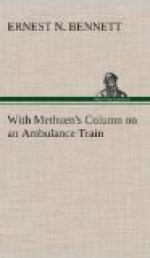Several of our cases on this downward journey were interesting. Corporal Anderson of the Black Watch lay in our ward, struck deaf and dumb from the bursting of a Boer shell, though he was otherwise uninjured by the explosion. Wounds through the intestines were to be found here and there. Such injuries in the larger intestines, if left to themselves and not operated on, have—when inflicted by the humane Mauser bullet—a fairly good chance, and that is all that can be said. One man had been shot through the elbow as he lay at the “present”. The bullet had shattered the bone, but there was every prospect of the arm being saved. How different would have been the probable effects, in such a case, of the big Martini bullet!
One incident which seemed to amuse the men very much was this. During the Modder River battle a bullet struck a corporal on the back; it glanced superficially across his shoulder and then piercing his canteen-tin remained inside. The corporal, imagining himself in extremis, fell to the ground and called for the ambulance. Somebody ran up to the prostrate man, and after a diligent but fruitless search for the wound at length discovered the bullet in the canteen-tin. The apparently moribund corporal, seeing this, instantly recovered, and leaping briskly to his feet told them to countermand the stretcher-bearers and pressed forward to the attack with renewed vigour.
Just as we left De Aar a train full of Queensland Mounted Infantry was entering the station en route for the front. The occupants were in the highest spirits and cheered loudly. “Ah!” said some of our poor fellows, “we were like that when we went up!” The contrast between the two trains—there, life and vigour: here, weakness and death—was very striking.
So far from being “absent-minded” about their people at home, the wounded soldiers were continually thinking about their sweethearts, wives and families. Several soldiers in my ward, e.g., had lined their helmets with ostrich feathers. “My eye,” said they, “won’t the missus look fine in these!” One of the reservists asked me: “Do you think I shall lose my thigh? You see, I want to do the best I can for my family, and if I do lose my leg I shall be useless, as I work in the pits in Fife.” Another Scotchman, a shoemaker, was full of anxiety about the future support of his wife and children. “If only my wound,” he said dejectedly, “had been below my knee instead of above it! Because this”—pointing to the wounded spot—“is just the place I use for my work.”
Yes! to mix with the rank and file of an army as one of themselves is a great privilege. One understands them in this way far better than through the medium of books. Many little acts of unostentatious heroism are casually spoken of—noble deeds done by humble soldiers who live without a history and often perish without a memorial—as, for instance, the devotion of a private at Modder River




